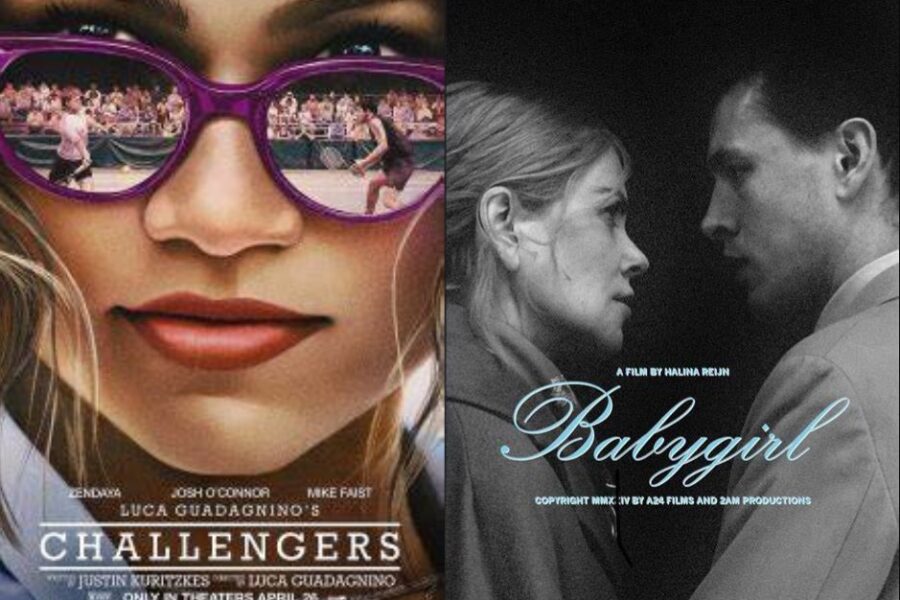It’s been a unique year for me: I’ve only watched 4 films and 3 of them were at Parent & Baby screenings. Being on maternity leave has kept me busy and out of the cinema.
As a result, I haven’t stayed on top of film score releases since Mark Kermode’s final Scala Radio show in February, although I have spent my free time immersed in the world of cinematic music thanks to co-writing a book on the subject with Mark. More on that to come in the new year; all I’ll say for now is that I have LOVED working on it and I’m ridiculously excited about the release!
This, therefore, is a rather limited list. I haven’t listened to every film score released in 2024, so I can’t say that these are the best of the bunch. Nor have I watched any of the films named below, so I have absolutely no authority as to whether, or how, the music enhances the films – but if we allow ourselves to overlook those rather crucial elements, here are the 10 scores that have been particularly impressive to me as stand-alone listens, in alphabetical order:
Babygirl – Cristobal Tapia de Veer
I’ve been a huge fan of Cristobal Tapia de Veer since falling in love with his music for the excellent Channel 4 drama Utopia. This was my introduction to his use of mad sounds (animal noises and distorted vocals are commonplace in his scores) and I would regularly listen to the Utopia finale at work when I needed a bit of motivation. He tends to bring something of a curveball energy and darkness to his scores, and I’m here for it.
Having said all that, I still wasn’t prepared to fall for his Babygirl score as much as I have. Advance singles ‘Mommy’s Dollhouse’ and ‘Wolves’ did the job of building anticipation for the full score release and the album is quite the listen.
‘Mommy’s Dollhouse’ makes a grand ballroom entrance. It’s big and ostentatious yet pretty traditional-sounding for the experimental composer, but just when you think he’s playing it safe, you hear ‘Wolves’ and let the weird sounds wash over you. Mangled breaths and wolf noises create a type of call to action or war chant, and you can’t help but be impressed with the sheer confidence of it all.
I love the recurring solo soprano voice and the inclusion of the piano, both playful in ‘Mentor’ and a touch melancholy (and menacing?) in the closing title track. The occasional squonk adds to the overall vibrant palette, not least with the gloriously warped vocals in ‘Whatever I Tell You to Do’.
Challengers – Trent Reznor & Atticus Ross
If my social feeds and algorithms are anything to go by, this was one of the most hyped – and embraced – scores of the year, as Reznor and Ross continue to show us that they’re one of the most versatile duos in film music.
Put simply, IT BANGS.
This is a soundtrack that needs to be played loud, preferably in a sweaty club. Sweat feels like an important factor here. The title track, ‘Yeah x10’ and ‘The Signal’ all sound like instant anthems, and the addition of soft and woozy cues like ‘l’oeuf’ create much-needed moments for us to catch our breath.
It takes a little while to get used to some of the tracks’ sudden cut-off endings but that’s a minor quibble. All in all, it’s a total ride. And there’s a remix album by Boys Noize – how many film scores get that treatment?!
It’s worth mentioning their more recent film project which, yet again, takes us in another musical direction. Collaborating once more with director Luca Guadagnino, the duo have created an immersive, longing and languid sound for Queer, with an excellent opening track ‘Vaster Than Empires’, featuring vocals by Caetano Veloso, and a sublime string-heavy cue ‘God Had to Create’.
Maestra – Anne Chmelewsky
Anne Chmelewsky appeared on my radar in 2018 with her accomplished score for Amma Asante’s Where Hands Touch, and I was excited to listen to her music for this documentary about women conductors.
This is a warm score, full of optimism. It’s very assured and accessible, and stand-out cues include ‘First Place’ and the triumphant ‘The Competition’. I’d love for Chmelewsky to have the opportunity to score a bigger budget picture, perhaps in the world of animation, which has opened up recently to the fact that women composers can be trusted to deliver – who could have guessed?! – with the likes of Andrea Datzman scoring Inside Out 2 and Abigail Barlow and Emily Bear writing songs for Moana 2.
Magpie – Isobel Waller-Bridge
2024’s been a busy year for Waller-Bridge who’s continued to flex her strengths scoring for complex female characters with TV series Three Women and Sweetpea. She’s already proved herself a dab hand at scoring British comedies and period dramas – Wicked Little Letters, Phantom of the Open, Emma. – but I’m particularly intrigued by her more lowkey scores.
If you enjoyed her work on Vita & Virginia, I think you’ll be taken by her ominous, glacial music for the Daisy Ridley-starrer Magpie, which makes good use of sinister-sounding wind instruments and prickly plucked strings. Waller-Bridge leans into the uneasy elements of the film, and stand-out cues include ‘Matilda’s Last Scene’ and ‘Coda’.
Memoir of a Snail – Elena Kats-Chernin
If the name Elena Kats-Chernin rings a bell but you can’t recall her most popular piece, listen to the title track of this stop-motion animation. It’s the playful sibling to her bank advert hit ‘Eliza Aria’ from her ballet Wild Swans and features the familiar vocals of soprano Jane Sheldon – and it’s a delightful opening to this score.
Featuring joyful playing by the Australian Chamber Orchestra, especially on plucktastic cues like ‘Family Outing’, ‘Laughter Club’ and ‘Pinky’s Shenanigans’, there’s also a liberal amount of dialogue from the film between the cues.
The piano-led piece ‘Gilbert’s Magic’ is gorgeously wholesome, making you want to hug your loved ones, and the strings positively SING in ‘Ken’s Theme’. Heartwarming stuff.
Stay Mum – Aska Matsumiya
I was introduced to the music of Aska Matsumiya by Mark Kermode who was really taken with her score for the 2018 short film Clavadista. We featured cues from it on his Scala Radio show along with later releases like Selah and the Spades and I’m Your Woman, before Mark selected After Yang as his score of the year in 2022.
Therefore, I was happy to see she’s had a productive 2024 with screen music releases including the Japanese film Kakushigoto, or Stay Mum. The bright yet slightly unsettling woodwinds in Opening Theme instantly drew me in, before an acoustic guitar and vocals number ‘Savor’ disarmed me a bit, only for the woodwinds to return in cues like ‘Jenga Play’ and ‘Summer Haze’.
At times creeping and a little bit creepy – especially in ‘He Came For the Boy’ which develops into a chilling listen – this is a score that seems to reserve judgement, fitting perhaps for a story about a woman pretending to be a boy’s mother. In fact, the End Credit seems to veer off in a new musical direction, making a conscious effort not to provide a conclusion.
The End We Start From – Anna Meredith
Released at the start of the year, in time to feature on Mark Kermode’s Scala show, this subtle score manages to straddle the fine line between sadness and optimism. Listening to it in full is an interesting experience; it comes in waves and there are moments of shimmering beauty within the rather sparse musical textures.
I particularly like the soft, ethereal opening to ‘Empty’ that becomes filled with insisted, pulsating beats. As ever with an Anna Meredith score, this is worth spending time with.
The Return – Rachel Portman
A new Rachel Portman score is always a welcome arrival. Let’s not forget that she remains the ONLY woman composer to have received more than one nomination in a scoring category at the Oscars – for Emma (which she won), The Cider House Rules and Chocolat. Isn’t that mad?
I don’t know if The Return has the awards clout behind it to garner Portman another nod, but it would be a deserving addition to any scoring nomination list. This is sophisticated, brooding and immersive, with strings that give an emotional gut punch.
Listening to the score in full is a masterclass in dramatic scoring. There’s foreboding and restraint in the sequence from ‘Penelope Attacks the Cloth’ to ‘Two Pools of Blood’, all leading up to the elegant concluding cue ‘Forgive Me’, which demonstrates yet again that Portman is a consummate composer who makes film scoring seem so easy.
Starve Acre – Matthew Herbert
Matthew Herbert is an exceptionally unpredictable and ambitious composer, and I love his screen music, especially for films The Wonder and Port Authority. He’s in his element here for Starve Acre, delivering textured musical eeriness in spades.
There’s a creepy whistle sound at the end of ‘Listen’, which would have made it a shoo-in for regular feature the Whistling Track on Mark Kermode’s Scala show, and elsewhere we find harp alongside light squelchy sounds in ‘Marshland’. Squonkiness sits with more gentle pastoral moments and the soundtrack concludes with actor Matt Smith providing vocals (and more whistles) on stripped-back yet catchy folk song ‘Let Me In’.
We Live in Time – Bryce Dessner
As a huge fan of The National, it’s not too much of a surprise to find myself a fan of Bryce Dessner’s film scores which tend to be thoughtful and incisive, with just the right amount of an emotional heft.
I really liked the quirkiness of Bardo, co-composed with director Alejandro G. Iñárritu, and also enjoyed C’mon C’mon, co-composed with his brother Aaron, and it’s worth mentioning his other 2024 score Sing Sing which is garnering plaudits for the ever-excellent Colman Domingo – however, for me, We Live In Time is Dessner’s best yet.
This is a score that is both uplifting and devastating. Some people may find it too much of a heartstring tugger, but I think that’s the point. I listened to it while watching my baby boy crawling around his room and I started welling up as I thought about how quickly he’s growing up, which felt like an apt reaction to music from a film about life and our time on earth.
I love the flute and woodblock (I think) refrain in ‘Bouncing Ball’, repeated later in ‘Kicking the Door In’. ‘Carousel’ could easily be an instrumental song by The National, and the piano-led ‘The Final Competition’ with the recurring ebullient woodwinds is nothing short of gorgeous. I can’t wait to see the film, although I already know I’ll be an emotional wreck.
So there you are! Thank you for reading – and please tell me about your favourite film scores of 2024. Which ones will dominate during awards season, and which would you love to among the nominees?




